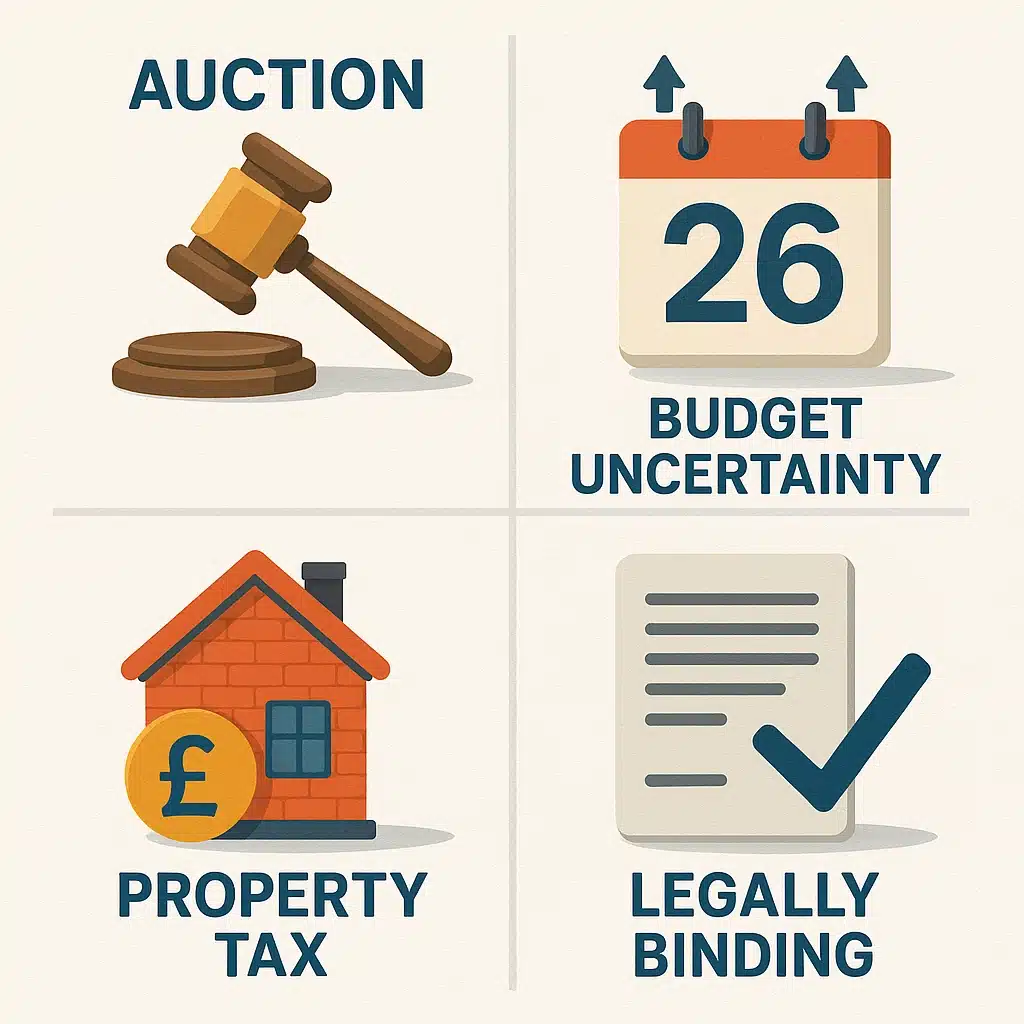Selling Your House by Auction in Autumn 2025: Should You Do It Now?
Thinking of selling your house by auction in Autumn 2025? With the property market slowing ahead of the 26 November Budget and possible new taxes, discover the pros and cons of auction sales, why an unconditional auction matters, and whether now is the right time to sell.
Call 0800 862 0206 for your FREE sale price estimate
Home: Auction Link » News » Selling Your House by Auction in Autumn 2025: Should You Do It Now?
As we move into Autumn 2025, many homeowners and buy-to-let (BTL) landlords, are asking whether now is a good time to sell their property – and whether selling by auction might be the smart route. With the UK housing market showing signs of strain, and major tax and fiscal changes possibly on the way, auction sales are under renewed consideration. Below we explore the current market, what’s at stake, and when, how, and whether to use the auction route.
Updated by: Mark Grantham on 12th September 2025

Current State of the UK Property Market
Several surveys, especially from RICS (the Royal Institution of Chartered Surveyors), point to a market that has slowed significantly in recent months. Key headline findings:
- Buyer demand has waned: new buyer enquiries are falling.
- Agreed sales are down sharply.
- House price sentiment is negative in many regions. Net balances for rising vs falling prices show modest downward pressure.
- New vendor instructions (i.e. new properties coming to market) are not as plentiful. Some areas have seen decline or flat‐lining.
Why the slowdown? A large part of it is uncertainty: political, fiscal, economic. The Government has confirmed an Autumn Budget on 26 November 2025, and there is widespread speculation that it may include property-related tax changes (possible new levies, reforms to stamp duty, changes to how rental income or capital gains are taxed).
In short: many potential sellers and buyers are taking a “wait and see” approach. Sellers are uncertain whether to act now in case taxes bite later. Buyers are unsure whether prices will drop further, or whether policy changes will shift their cost calculations.
Why Some Sellers Are Considering Exiting Before the Budget
For property owners, especially landlords, there is a strong incentive to act before possible tax hikes. Some of the changes being floated:
-
Introducing National Insurance contributions on rental income, which currently is largely exempt.
-
Replacing or reforming Stamp Duty Land Tax (SDLT), possibly introducing an annual property levy or a sale tax for homes over certain thresholds (for example over £500,000).
-
Extending or removing certain Capital Gains Tax (CGT) exemptions – especially for high‐value primary residences.
-
Possible reforms to council tax, wealth taxes, inheritance tax, etc.
Given the Government is also facing budgetary pressure (a large “black hole” in public finances), there is a real chance that changes will be fairly wide‐ranging.
So for many sellers, especially landlords who might see their profits squeezed, or homeowners with properties likely to trigger higher taxes, the logic is: sell now rather than wait until you may lose more through taxation or regulatory cost burdens.
Why Many Sellers Are Holding Off
On the other hand, many property owners are pausing, for several reasons:
-
They worry that in a slow market they might not get the price they want. With buyer demand down, fewer people are bidding, so houses might linger on the market.
-
Some hope that after the Budget, once there’s clarity, confidence might improve, possibly bringing in new buyers. They might wait until Spring 2026 for that effect.
-
Concern that any tax changes might be softened or postponed, or that transitional measures or exemptions will be introduced, so they prefer to delay if possible.
Is There Still Activity? Good Time for Buyers
Yes – there is still activity in the market. Some of the reasons:
-
Lower competition: fewer buyers means less competition, so buyers who are in the market may get more favourable terms.
-
Prices are under downward pressure, so buyers may be able to negotiate.
-
Some buyers may act now ahead of anticipated tax increases, especially if they believe a tax on property sale, or on rental income, etc., will make property more expensive to hold or transact in future.
Thus, while the market is quieter, that gives opportunity for those ready, willing, and able, to act under less pressure.
Key Features of Auction Sales
- Legally Binding on the Fall of the Hammer
One of the biggest advantages of a true auction is that once the hammer falls, the sale is legally binding. The buyer has to proceed, paying a deposit immediately. This contrasts with typical private treaty sales, where offers can fall through, chains collapse, etc. In a market with lots of uncertainty, that certainty can be very valuable. - Competitive Bidding
Auctions can bring competitive bidding, which can push the price upward, especially if multiple potential buyers are interested. However, in a slower market, that competitive pressure may be weaker. Sometimes there’s just one bidder who meets the reserve. So you shouldn’t assume huge bidding wars are guaranteed.
Pros of Auction in the Current Market
- Certainty: Because of the binding nature, you avoid the risk of buyers pulling out at last minute. Especially when many buyers are nervous about what will happen with taxes or interest rates, having a committed buyer helps.
- Faster sale: Auctions tend to have fixed timelines; you know when the auction will be, when exchange will happen, etc. If you want exit quickly (e.g. before the Budget date), auctions may offer a quicker route.
- Attracting motivated buyers: Those buyers who do come to auctions are often serious. They may be those who believe there could be bargains due to market softness.
- Setting reserve price: You can set a reserve price, so you don’t risk selling below a level you consider unacceptable.
Cons / Risks of Auction in the Current Market
- Price uncertainty: If few bidders, or competition is weak, you may not get much above the reserve. In some cases, you might even get less than you could via a private treaty sale in a better climate.
- Costs: Auction houses often charge fees (for marketing, for vendor’s commission, etc.), which you’ll need to factor.
- Less exposure time: Traditional marketing may reach more buyers over time; in a slow market, fewer bidders may show up.
- Risk of conditional auctions: As we’ll discuss below, not all auctions are the same. Some “auctions” are conditional, meaning that although bidding happens, the contract isn’t legally binding immediately on the fall of the hammer.
Unconditional Auction vs Conditional Auction
An important distinction to understand – and one that sellers must be wary of:
-
Unconditional auction: The traditional or true auction model. On the fall of the hammer, the buyer is legally bound to buy; they typically pay a deposit and exchange contracts. This gives the seller immediate legal commitment.
-
Conditional auction: Sometimes called “the modern method of auction”. In these, even though bidding occurs, there may still be conditions to be met (e.g. finance, survey, etc.), or the buyer may have a period after the auction to confirm or rescind. This undermines much of the certainty that makes auctions attractive, especially in uncertain markets.
If you are considering selling by auction, make sure that the auction is unconditional if what you want is legal certainty on exit. Conditional auctions can leave you exposed to delays, or even the buyer withdrawing.
So Should You Sell by Auction Now, or Wait?
Putting all these pieces together, here are some guidelines to help decide whether to sell by auction in Autumn 2025:
| Scenario | Auction Now Makes Sense |
|---|---|
| You expect near-term tax/regulatory changes to cut net proceeds (e.g. CGT, SDLT, NI on rent). | ✅Yes – lock in current rules with an unconditional sale. |
| You prioritise certainty/speed over squeezing out a higher price later. | ✅Yes – auction exchange is legally binding on the fall of the hammer. |
| Your property may attract fewer bidders (slower market/unique asset/limited finance availability). | ⚠️Be cautious – set a realistic reserve; don’t rely on bidding wars. |
| You must exit before the 26 Nov 2025 Budget or for personal/financial timing reasons. | ✅Yes – fixed timetable and binding exchange provide certainty. |
| You believe confidence/pricing will improve into Spring 2026 and can afford to wait. | ⚠️Maybe – waiting carries policy/price risk; weigh against potential upside. |
Tip: Prefer an unconditional auction (legally binding on the fall of the hammer). Be wary of conditional auctions, which don’t give immediate legal commitment.
Conclusion
Autumn 2025 presents a tricky crossroads for property sellers. On one hand, uncertainty around the Budget on 26 November 2025 is dampening buyer and seller activity, and many actors are hesitating – “sitting on their hands” – while they await clarity. On the other hand, lurking tax changes (CGT, SDLT, National Insurance, property or wealth taxes) make it likely that costs of holding or selling property will rise.
For many, selling by unconditional auction now could be the best way to get a legally binding exit, avoid future tax penalties, and achieve a certain sale even if pricing is more constrained. If you choose the auction route, set your reserve carefully, ensure the auction is legally binding, and work with a reputable auction house.
If you can afford to wait and want to see whether the market improves (after the Budget, in 2026), that may pay off – but you’ll be taking on risk: tax changes, possibly more competition among sellers, or continuing uncertainty.
How much does it cost to sell by auction?
Commission is typically in the region of 2%+VAT of the final sale price, only payable when your property successfully sells.


